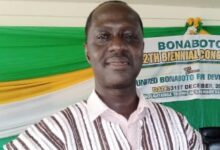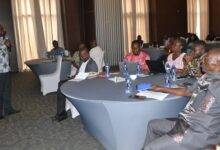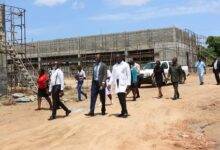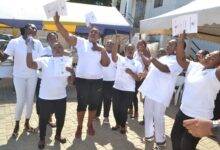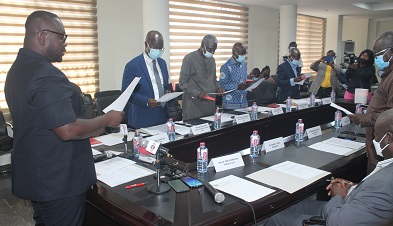
A team of engineers has been constituted to commence the structural integrity audit of public buildings and ascertain their earthquake resistance readiness, Acting Board Chairman of the Engineering Council of Ghana, Professor Mark Adom-Asamoah, has disclosed.
He explained that the professionals include Geological Engineers, Structural Engineers, Geotechnical Engineers and Earthquake Engineers, and were currently putting up the list of the various buildings that required structural integrity audit in the 16 regions of the country.
Professor Adom-Asamoah disclosed this in Accra yesterday, when the Minister of Works and Housing, Francis Asenso-Boakye, inaugurated the eight-member Board of Directors of the Council.
The Ghanaian Times in its Wednesday, October 27, 2021 issue reported that “Ghana’s preparedness for earthquake: Auditing of public buildings set to begin … Osu castle, Jubilee, Parliament House, others included.”
The story said the Engineering Council (EC) was gearing up to begin a structural audit of all public buildings and structures in the country, including the Christianborg Castle (Osu Castle) and Jubilee House, the former and current seats of government.
It mentioned other edifices earmarked for the exercise aimed at checking their capability to withstand earthquakes include Parliament house, courts, National Theatre, office blocks of Ministries, Departments and Agencies, stadia, hospitals and markets.
Prof. Adom-Asamoah said a code of specification had been formalised to help the team undertake the structural integrity audit to enable them to come up with a comprehensive assessment on the buildings.
“Currently, we are looking at the budget, and what are needed to go to the field because we may need some equipment such as non-destructive testing ones. We also need some basic logistics because if engineers are to be sent to the 16 regions issues such as lodging and transport among others should be considered to commence the operation,” Professor Adom-Asamoah stressed.
He indicated that buildings which did not meet the requirement of the code of specification would be pulled down, whilst expert advice would be provided on those that needed to be renovated.
“Some buildings will have to undergo refurbishment to enable us do retrofitting, although, most of these buildings met certain specification code of practice after construction and oftentimes these buildings need to undergo structural integrity audit after years of construction,” he said.
Mr Asenso-Boakye said the mandate of the council was to regulate the practice of engineering, provide and secure the highest professional standards in the practice of engineering.
He observed that the Council played a significant role in the development of the country to ensure structures met standards and did not become threat to society as a result of shoddy work.
Members of the Board are Valence Wise Ametefe (Engineering Council), Frederick Kwabena Akwaboah (Registered Professional Engineers), and Philip Kwame Aheto (Registered Engineering Technologist).
The rest are Eric Otenkorang Ankrah (Registered Engineering Technician), Eric Atta-Sonno (Registered Engineering Craftsman), Alberta Siaw Kwarko (Engineering related Ministries) and Ebenezer Kwesi Haizel (Legal Practitioner)
BY BERNARD BENGHAN


